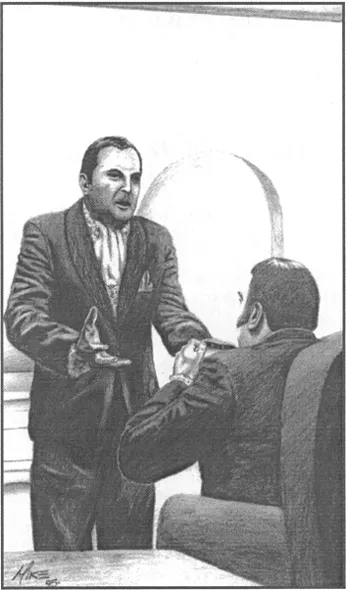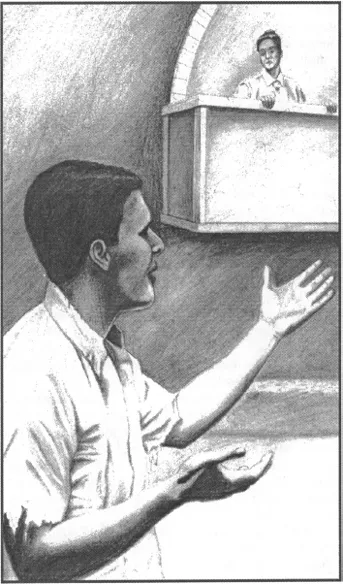![]()
SECTION TWO
Uncle Tom’s Cabin
Chapter 1
New Characters:
Mr. Shelby: benevolent owner of a Kentucky plantation
Mrs. Shelby: Mr. Shelby’s religious wife
Haley: a slave trader
Eliza: Mrs. Shelby’s servant, Harry’s mother
Harry: four- or five-year-old son of Eliza
Summary
The book opens with a scene in which Mr. Shelby and Haley the slave trader are discussing business matters on Shelby’s plantation in Kentucky. Mr. Shelby, a gentleman planter described as “a fair average kind of man, good-natured and kindly,” has fallen into debt and must sell Uncle Tom, a trustworthy servant. Mr. Shelby vouches for Tom’s good working habits and Christian character. Haley, however, desires that more slaves be added to the deal to cover the debt. Little Harry, a boy slave, playfully interrupts the meeting and entertains the men with singing and dancing. Eliza, Harry’s mother and Mrs. Shelby’s personal servant, comes to retrieve her son. After they leave, Haley tries to convince Mr. Shelby to sell Eliza and Harry. Mr. Shelby refuses to sell Eliza out of respect for his wife, but he reluctantly considers parting with Harry.
Eliza overhears some of the two men’s conversation when she takes away Harry and proceeds to tell Mrs. Shelby her worries. Mrs. Shelby is unaware of her husband’s troubled financial status, and naively reassures Eliza that nothing will happen to her or her child. Mrs. Shelby is portrayed as “a woman of high class, both intellectually and morally.”
Analysis
The reader is introduced to the conscience-stricken Mr. Shelby, who has fallen on hard times, and the greedy slave trader, Haley. Despite being a refined gentleman and humane slave owner, Mr. Shelby becomes caught in the morally distressing situation of dealing in human property. He treats his slaves kindly, almost as if they are a larger part of the family. Because the slaves are considered as humans and as property, their status only makes Mr. Shelby’s decision to sell some of them more painful. Mr. Shelby chooses to sell Uncle Tom to cover some debts he owes to Haley. Tom at this point does not appear in the chapter, but the reader learns about him from Mr. Shelby’s description. He emphasizes that Tom had been converted to Christianity four years ago, and can be trusted with various chores around the plantation. Since Tom is a valuable servant, Mr. Shelby hopes that the sale will be enough to end his debt.
Haley, on the other hand, is the opposite in character to Mr. Shelby. The slave trader is portrayed as “a short, thick-set man, with coarse, commonplace features,…a low man who is trying to elbow his way upward in the world.” Being shrewd and greedy, Haley is aware of Mr. Shelby’s financial situation and takes advantage of it, asking for another slave in addition to Tom to settle the debt. When little Harry and Eliza enter the room, Haley offers to take them both. Mr. Shelby initially balks at Haley’s bartering methods. As he states to the slave trader: “I’m a humane man, and I hate to take the boy from his mother, sir.” Mr. Shelby’s humanity is flawed, however, by his own financial mismanagement. He eventually must carry out what he hates to do: take Harry away from Eliza.
A major theme emerges in this chapter and reappears throughout the book: the emotional strain slavery places on families, both black and white. The author emphasizes that the break up of slave families is inhuman. As will be seen later, slavery’s evils also affect slave owners and traders. Haley is dehumanized by his business. He views slaves as property and thinks nothing of separating a mother and her children. Mr. Shelby, although a kind man, must still barter with Haley, thus becoming dehumanized as well. Mrs. Shelby’s religious principles will be tested later when she confronts the reality of slavery.
The horrors of slavery are more immediately understood through the experiences of the slaves themselves. At several times further in the novel, Harriet Beecher Stowe addresses the reader directly by asking how anyone would feel if their children were forcibly taken from them.
The author uses a variety of stylistic devices. She employs foreshadowing by setting the scene during a late afternoon “of a chilly February day.” This description heightens Mr. Shelby’s depressed mood, and also hints at the bleak future for Uncle Tom, Eliza, and Harry.
Stowe depicts her characters through their dialect. Haley speaks in a rough, backwoods language. Regarding slaves, he unfeelingly says: “Lor bless ye, yes! These critters an’t like white folks, you know; they gets over things, only manage right.” Haley’s manner of talking reflects the coarseness of his occupation and his whole character.
Study Questions
1. Why does Mr. Shelby need to sell some of his slaves?
2. Describe why Mr. Shelby thinks that Uncle Tom is a responsible servant.
3. What story does Haley tell to Mr. Shelby in regard to selling slaves?
4. What does Harry do to unintentionally attract Haley’s notice?
5. How does Haley view Mr. Shelby’s kindness toward slaves?
6. What is Mr. Shelby’s religious position compared with Mrs. Shelby’s?
7. What does Eliza suspect about Mr. Shelby’s meeting with Haley?
8. How does Mrs. Shelby detect that something is wrong with Eliza?
9. Why does Mrs. Shelby not believe in Eliza’s fears that Mr. Shelby will sell Harry?
10. Despite benevolent masters such as Mr. Shelby, what does the author point to regarding the inevitable failure of treating slaves like family?
Answers
1. Mr. Shelby must sell some slaves, because he is in debt to Haley.
2. Mr. Shelby trusts Tom with responsibilities because Tom is honest and pious. Mr. Shelby had even sent Tom to Cincinnati on a business matter and Tom returned afterwards instead of fleeing.
3. Haley tells Mr. Shelby of an incident in which a trader bought a woman, but did not want her child. Separated roughly from her baby, the slave woman died from overwhelming grief. Haley reassuringly says that he would have treated the situation more gently and diplomatically.
4. Harry playfully interrupts the meeting between Haley and Mr. Shelby, singing and dancing at Mr. Shelby’s request. Haley immediately thinks that Harry could be sold at great profit as a waiter.
5. Haley views Mr. Shelby’s kindness toward the slaves as wrongheaded since it gives them unrealistic expectations of a stable family life.
6. Unlike his wife, Mr. Shelby is not particularly religious. He does, however, revere Mrs. Shelby’s opinions and believes that she “had piety and benevolence enough for two.”
7. Eliza suspects that Mr. Shelby will sell her son Harry to Haley.
8. Mrs. Shelby detects that something is on Eliza’s mind when Eliza works distractedly and accidentally breaks a wash-pitcher and upsets a table.
9. Mrs. Shelby thinks that Eliza’s fears are imagined, because she cannot believe that Mr. Shelby would sell any of his slaves, much less deal with slave traders. Mrs. Shelby believes that the servants are part of the family.
10. The author stresses that the law considers slaves as things rather than as humans. They can then be bought or sold regardless of personal attachments.
Suggested Essay Topics
1. Describe Mr. Shelby’s relationship to and views on his slaves. What difficulties arise from his position?
2. Describe Haley’s opinions on the slave trading business. In what ways is he being harsh, or is he being realistic?
Chapters 2 and 3
New Characters:
George Harris: Eliza’s husband and Harry’s father
Mr. Harris: George’s hard plantation master
A kind manufacturer: George’s employer at a factory, as yet unnamed
Summary
The two chapters here include the personal histories of George and Eliza Harris. The reader learns that Eliza had been raised from childhood by Mrs. Shelby. Eliza then met and married George, a slave on a nearby plantation. Hired out by his master, Mr. Harris, George works at a factory, in which he invents a hemp-cleaning machine. Because of George’s diligence and handiness, he becomes a favorite among his employer and fellow laborers. During this period of their lives, George is allowed great freedom in his work, and Eliza has given birth to Harry.
Mr. Harris, however, is envious of his slave’s success and popularity. George is taken back to the plantation, where he is “put to the meanest drudgery of the farm.” In the meantime, George keeps his anger from showing. George’s former employer visits the plantation, and tries to persuade Mr. Harris to let George return to work at the factory, but to no avail.
When George visits Eliza at the Shelby plantation, he recounts the hardships of laboring on his master’s farm and the unfair treatment he receives. Beaten and tired, he exclaims: “I wish I were dead!” His attitude frightens Eliza, and she tells him to trust in God. George, however, confesses that his troubles appear too overwhelming; he cannot find comfort in religion. He resolves to escape to Canada, and then buy Eliza’s and Harry’s freedom. He concludes that despite the risks involved, he would rather die than be captured and returned to his present state of servility.
Analysis
Several incidents occur that threaten the Harris family, all because of its slave status. Earlier, in Chapter 1, Eliza worries that her son will be taken from her and sold. Chapters 2 and 3 depict the whims of George’s tyrannical master, Mr. Harris (slaves took the surname of their masters). Although George works well in the factory, his owner is resentful of his accomplishments. By taking George away from the factory, Mr. Harris asserts his authority on his own property, despite others’ protests.
The theme of maintaining a family in the face of slavery also concerns Mrs. Shelby, who has a long developed fondness for Eliza, having raised her almost like a daughter. Mrs. Shelby had even encouraged the marriage between Eliza and George, and had taken an active part in the festivities. She displays a maternal concern for them. Eliza and George in turn feel that their relationship is sanctified by the marriage ceremony, and their son Harry makes the family whole.
The benevolent factory owner is never identified by name in this chapter, but will be subsequently in the novel. The author uses a dialogue between the manufacturer and Mr. Harris to reveal the nature of slavery. The kindly employer thinks that George is well-adapted to the business and treats him humanely. To this, the hard master replies: “It’s a free country, sir; the man’s mine, and I do what I please with him,—that’...


